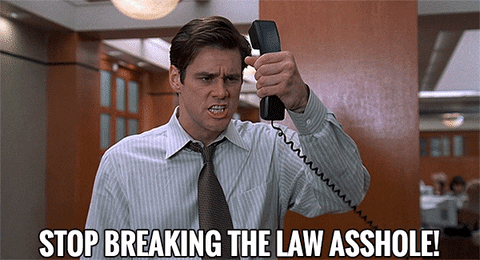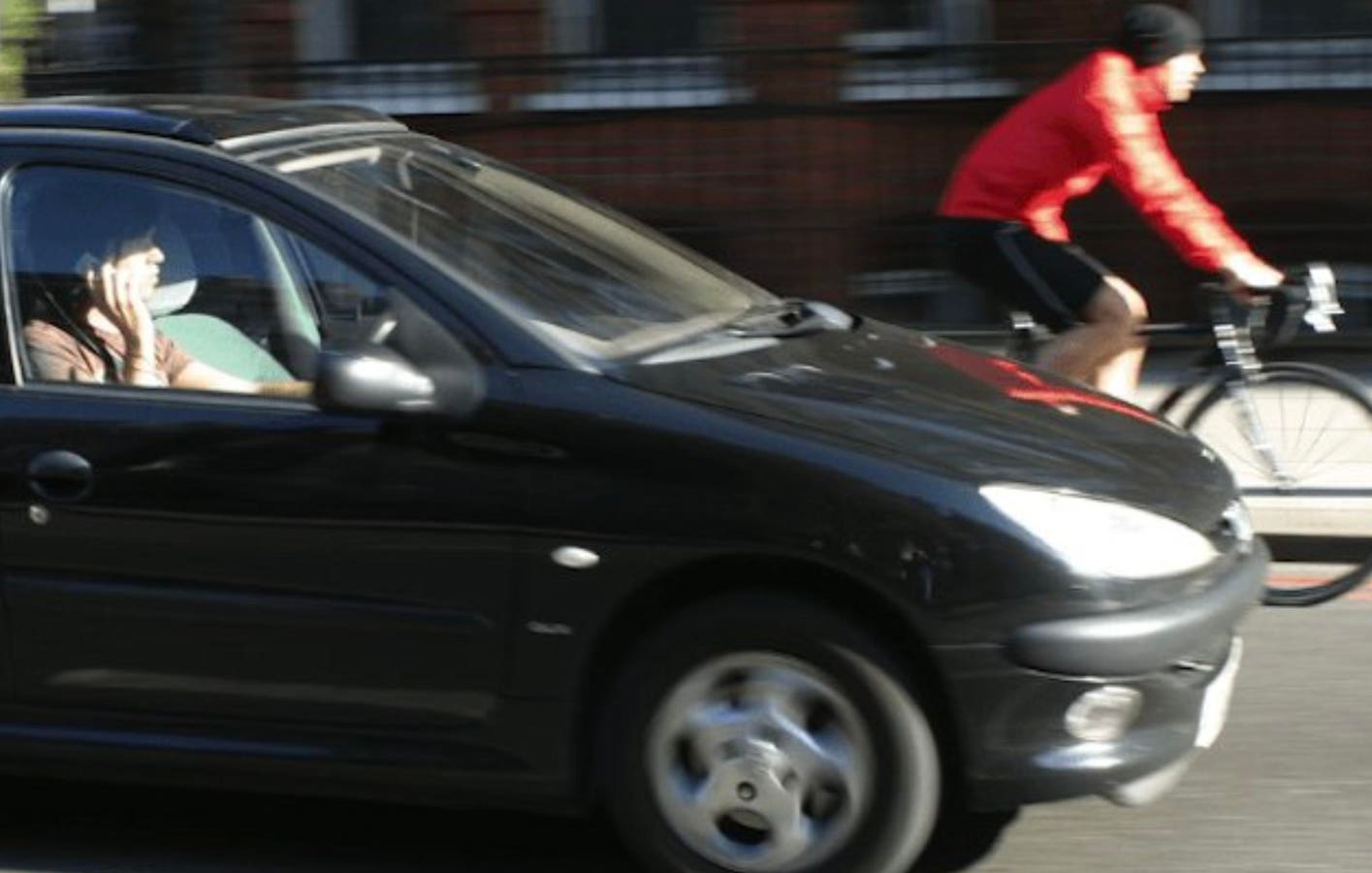As a cyclist that drives, this was an interesting, although unsurprising read.
The expectation drivers place on other drivers is that they must be going as fast as physically possible at all times regardless of road rules. This creates an environment where motorists are literally breaking the law constantly. Other drivers will literally harass or even put your life in jeopardy if you drive the speed limit. Going 10-20kph over the limit is expected. Rolling through stop signs is expected. Cutting off buses is expected. Drivers do not tolerate anything that will even remotely slow them down for the tiniest fraction of a moment.
and yet if a cyclist rolls through a stop sign at an empty intersection then drivers will deeply criticise them to a level they never would if that same person was behind a wheel instead of handlebars. Other drivers are certainly disrespectful to each other but the hatred drivers have for cyclists is, quite frankly, goddamn disturbing and terrifying. Drivers will regularly drive in ways endanger the lives of cyclists even if the cyclist is following the rules to the letter. There are so many helmet-cam videos of drivers intentionally intimidating cyclists or even taking faux swipes at them - and these are just the ones that were recorded. It happens constantly.
Perhaps unsurprisingly, the cyclist-drivers were significantly faster at detecting the appearance of fellow cyclists.
Cyclists that drive tend to have a unspoken understanding and respect for each other because we know the bullshit that we have to put up with. We also have a better understanding of the roads from the additional perspective and know what areas are dangerous, where to watch for cyclists, what laws cyclists need to follow, etc. I cycled for years before I got behind a wheel. This meant I already knew the laws and layout of my local roads before I even began.
As someone who currently has to drive for work the hatred towards cyclists is a major contributor to my opposition to cars. They oppose bike lanes and trains because they dislike bicycles and public transit, despite bike lanes and trains literally improving the lives of everyone behind the wheel by being the biggest reducers of traffic when properly implemented. It’s insane and it seems to be an alienation from fellow travelers.
The more alternative transportation options we provide in our cities and towns frees up that space for the remaining vehicular traffic.
I have no idea why a large part of motorists does not see this concept. Instead they seem to fight against it in their own best interests.
If you commute to work in a car and there are another 100+ road users with you all headed in the exact same direction, would you prefer them all to be in individual cars? Or would you prefer a few of those people take the tram, a few take a bus, a few hop on the subway, a few cycle, and the remaining few who can walk?
I have no idea why a large part of motorists does not see this concept. Instead they seem to fight against it in their own best interests.
It’s a common problem in humanity: seeing someone as an out group and hating them. That’s all. Facts don’t really matter. Cyclists are The Other and they Are Bad.
Me either. Even if I’m stuck in a car I want people on trains and bikes and all that. Multiple modes of transportation allows for a variety of use cases and it reduces traffic in a way nothing else can. I hate rush hour traffic, what I’d love is for a full train instead of a full road. Or like 20 bicyclists on a dedicated path next to me.
Big surprise of the day! /s
I think anyone who advocates for cycling and pedestrian safety have been saying this for decades.
This is also why it’s incredibly frustrating to have things like permitting Idaho Stops being pushed back so aggressively.
It keeps cyclists safe, but motorists argue that “everyone should be following the same laws”… except that 99% of motorists are ALREADY doing Idaho Stops, despite it being illegal for them to do so!
And pedestrians who don’t like cyclists on sidewalks. Yes, we get it! No cyclist wants to be on a bumpy, slow, narrow sidewalk. But it’s safer than on a road without cycling infrastructure! If you don’t like it, support bike lanes!
Are you calling “rolling stops” “Idaho stops”? I have never heard that and have lived on both coasts including WA. Interesting
Are you calling “rolling stops” “Idaho stops”?
So, depending on the state, an “Idaho Stop” can mean a few things.
But generally speaking, it allows cyclists to use red lights like stop signs, and stop signs like yield signs - both provided that the way is clear and the appropriate right of way is given to anyone else at those intersections.
It’s been around since the early 1980s, and several US states have legalized it. Canada - like, all of Canada - refuses to.
Idaho Stops not only make it safer for cyclists (proven through many studies over the last few decades), but it also decriminalizes cyclists who want to clear an empty, red light intersection where they would otherwise be stranded unless a car also stops at the red.
And with more people using cargo bikes, pulling kids on trailers, commuting, or running errands, it can save energy by keeping some momentum going as a cyclist approaches an empty intersection.
There are almost no downsides to permitting Idaho Stops, other than the need to educate drivers that what cyclists are doing is safe, and permitted.
since the early 1980s*
need to educate drivers
this is one of the big ones that shows up in our car-centric worldview – just sticking to motorized vehicles: truck drivers are expected to know truck rules, car rules, and motorcycle rules – motorcyclists are expected to know motorcycling rules, car rules, and truck rules – car drivers are expected to know car rules and that’s it
when the majority of our population doesn’t know about (and subsequently doesn’t care about) anything else sharing the road with them … car drivers that are just as aggressive towards motorcyclists as they are towards bicyclists, car drivers are completely oblivious to stopping distances and momentum of big rigs …
When I bike and have to use car infrastructure, I want the cars to behave predictably so that I can avoid any collisions. There is a commute that I have been doing the past few years where I have to approach a 4 way stop except the direction I come from is bikes only. Drivers could never figure out how to react. Some would completely yield, some would ignore me, and others would follow the road rules and wait their turn. This is probably one of the worst intersections I went through on a regular basis. To make the intersection even more crazy, the cars had dedicated right turn lanes, at this stop sign, making drivers think they can just ignore the road rules and turn right when it was not their turn.
since the early 1980s*
Noted and corrected 👍
I’ve heard the term, but a better one is just “not actually stopping”
Pretty sure they call rolling stops “California stops” in Idaho.
I’m disappointed that the article couldn’t give specific examples even if there was variation in responses.
Where I live, you basically gotta do the opposite of what’s “legal” to survive. Most bike lanes are unprotected death traps. Etc.
Let me start by saying that I fully believe in fuck cars and instead having bike lanes and public transportation everywhere.
I alternate between commuting to work by car and bicycle, and I tend to observe other cyclists when I’m driving. What I notice is that a lot of cyclists place themselves in extremely dangerous situations, considering that there are careless drivers on our roads. Running red lights and stop signs is the least of it (I haven’t had a need to run red lights, but run stop signs regularly). Most of what I have observed where I live (an urban area) is not cyclists breaking the law to protect themselves, but the opposite: sometimes breaking the law and sometimes obeying the law, both in a way that makes things more dangerous for themselves and for drivers.
Some examples I’ve seen (more frequently than running stop signs - I very rarely if ever have seen a bicyclist running a red light and would completely understand if they had to do it because of stoplight sensors not detecting them):
Breaking the law (sometimes a combination of several of these):
- Riding on the sidewalk (arguably improves their safety in some ways, and worsens it in others)
- Riding the wrong way, against traffic (worsens their safety)
- Riding the wrong way, against traffic, on the sidewalk (greatly worsens their safety - I almost ran into someone doing this once because I just did not expect someone coming from the wrong direction at high speed in a completely unexpected place when I was turning into a driveway/side street)
- Riding on crosswalks when pedestrian walking lights are on (worsens their safety)
- Riding wearing headphones (not sure if illegal - it is for drivers - but worsens their safety)
- Riding on busy streets not wearing a helmet (not sure if illegal, but worsens their safety)
- Riding on the street at night with no bike lights (worsens their safety)
Obeying the law:
- Riding in just about the busiest, fastest street possible, when there’s a much safer, parallel, designated “bicycle” street to ride a block away. While this is legal, it makes things more dangerous for themselves and for drivers when they have a perfectly reasonable alternative. I personally go out of my way (literally) to find the least busy streets for my commuting route.
So I guess I’m saying that I’m surprised by the results of this study. I only scanned the actual paper, but one thing that comes to mind is that perhaps some/many cyclists have a greater disconnect between what they think improves their safety vs. what would actually improve their safety?
I tend to observe other cyclists when I’m driving.
So I guess I’m saying that I’m surprised by the results of this study.
That’s because you’re using anecdotal evidence. If you are looking for cyclists breaking the law, you’ll find it because of your inherent bias. This is precisely why studies are needed to back up what we think may be true but aren’t sure of. We have to cut away our biases.
Sure, I recognize that what I’m saying is anecdotal, obviously, and I recognize the need for real studies, but it was still surprising that what they seem to be saying in the article (again, I didn’t read the paper in detail) doesn’t match what I’ve seen in my city. I can assure you that I see more of the other things I listed than cyclists running stop signs. But maybe you’re right and I notice stop sign running less because I do it myself (edit: when I’m cycling, not when I’m driving).
Depending on the local laws, running red lights and stop signs can be perfectly legal. https://en.wikipedia.org/wiki/Idaho_stop
Studies have shown this can improve cycling safety.
Sure, I realize that. Maybe I wasn’t clear or perhaps overly verbose in my previous post, but my point is that running stop signs and red lights is the mildest form of “illegal” (in most places but not all) and like you said, arguably could be said to improve cycling safety. I just thought it was a weird thing to focus on. There seemed to be no mention of either why running stop lights or stop signs can improve cycling safety, or the myriad other ways that cyclists frequently break the law and make things more dangerous for themselves. Maybe there was mention in the paper itself, I didn’t read it in detail, but the article didn’t mention it.
PS: I upvoted you, by the way. Not sure who downvoted you or why.
Cyclists break laws to reduce exposure to cars and their drivers. Even walking on a footpath, you’re more likely to be killed by a car mounting the curb, or launching from a driveway than anything else. Car drivers are the apex predator of cyclists and pedestrians.
The reason cyclists avoid stopping is that our vehicles are pedal powered. If we lose all momentum, we take far, FAR longer to execute maneuvers. It means we spend longer in intersections, which are the MOST dangerous place for cyclists to be. Because of the cars.
And if we stop and wait, we need a far bigger gap than cars do. We cant inject fuel into our legs for a burst of speed. So drivers get impatient waiting for us to go and try to cut in front of us, turn in front of us, take any gaps we could’ve taken.
So the recommended action is to ‘take the lane’ (be in the middle of the lane so cars can’t pass us) and then drivers are angry we’re in the way and slowing them down and behave recklessly out of spite. Or politeness, sometimes drivers ‘help’ by stopping in the middle of intersections to create space, which also causes accidents.
Or we could be on the footpath, which means we now have to go much slower for safety and oh wait the biggest risk IS STILL CARS because drivers forget the footpath exist and launch out driveways at full speed without even looking. Cyclists, mobility scooters, skateboards; all irrelevant to the impatient driver.
So yeah, all the things that make using a light vehicle safer tend to make heavy vehicle users pissed off. I can do everything right, but if an impatient driver overtakes me in an intersection and collides with me, I’m still the one who ends up in hospital.
So… yeah. Being a defensive cyclists means minimizing interactions with drivers wherever possible.
the cherry on top: regardless of who’s at fault, the cyclist gets blamed
I agree with a lot of what you say and have experienced and done some of that myself. There are just a couple of minor terms of degree that I don’t quite agree with:
Cyclists break laws to reduce exposure to cars and their drivers.
I think that’s true some of the time, but not anywhere near all the time. A few of the things I listed that I’ve seen don’t reduce their exposure.
So yeah, all the things that make using a light vehicle safer tend to make heavy vehicle users pissed off.
Again, I generally agree, except that I think “all” is excessive. Plenty of things that cyclists do that piss off car drivers don’t make them safer.
Absolutely, but the same idiots that text while driving and microwave grapes can also buy bikes, so the existence of idiots on bikes cannot be assumed to represent a philosophy for cyclists at large (in your area, anyway). Are these things you see many cyclists doing? Or just things you’ve seen a cyclist do?
I see the concerns you’ve listed, and I agree they’re not safe. But I know why people choose several of them, even if I personally don’t do them. I have headlights and a reflective vest, but if your hobby bike doesn’t and you need to get home after dark, you deal. If there’s no safe space on the road, or the visibility is too poor, you deal.
Some of the other things you name, I haven’t seen and cannot fathom why somebody would do such things. We’re probably not from the same country (let alone area) so our cycling infrastructure will be different.
One of them I have done: riding the footpath in the opposing direction. I’m going at low speed so I can brake, but the only risk is of a bad driver being impatient - the same risk a mobility scooter, mailbuggy, skateboarder etc would have. And I do this if a) the road only has one path, and the otherside i would be exposed on the shoulder, or b) when my destination is close on the same side because it makes no sense to cross the road twice within 100m. Both are decisions I make to reduce my exposure to cars.
I’ve personally seen each of the things I listed multiple times. Sometimes several of those items at the same time (ex: cyclist riding at night, without lights and without a helmet, on the busiest street possible).
I understand why people would do some of those things, but not others. Like you, I have sometimes ridden without a helmet or without lights, and I understand that sometimes one is just caught unprepared. The main thing for me is that when I see extremely risky behavior, especially a combination of them like my example above, I worry tremendously for those people. I also seriously wonder if they are actively trying to get themselves killed.
Yes, I imagine that our cycling infrastructure and conditions are probably very different. I also feel that this study may have focused on some places that have better conditions and infrastructure (and cyclist education) than my area. This may explain the discrepancy in what the study found and my experiences.
What you’ve described all sounds very reasonable. I guess all I was trying to say is that the study had surprising results for me, and I worry that potentially misleading results could encourage cyclists to take more risky behavior. My concern is for cyclists’ safety and for the perception of cycling in general.
That’s fair, and you raise good points. Thank you for sharing and explaining your perspective.
The perception of cycling in general is already negative, but I suspect it has less to do with idiots on bikes and more that bikes can’t help but be in drivers’ way. Yet I still hear NIMBYs actively fight against bike lanes because they think cyclists are entitled, and don’t want to lose parking spaces to them, or get longer commutes if roads are converted to one-way. That’s not something responsible cycling can fix; that’s a direct result of car-centric culture being resistant to having a smaller slice of the pie.
EDIT: One thing to add. Human psychology is weird, and it treats being inside a car as like being in one’s own house. ‘Road rage’ is a real phenomenon of drivers feeling ‘territorial’ in protecting ‘their’ space. It means theyre more reactive, more impulsive, and often more spiteful. No doubt in part because driving is a highly demanding activity mentally, especially at higher speeds, so adrenaline spikes easily.
By comparison, we don’t get widespread ‘supermarket rage’ with our shipping trolleys, because it feels like a public space in a way ‘inside of my car’ doesn’t (and we’re slower and have time to think). And unfortunately, there isn’t anything cyclists can do about that, either.
Also, correction: I didn’t say all the things that piss off drivers are being done to make us safer. I said all the things that make us safer still tend to piss off drivers. Part of the Road Rage issue is that drivers get pissed off over any perceived infraction, regardless of context: even if their own inattention is at fault (like blaming people on the footpath for being in their way). Usually, the feeling passes In a couple seconds, but every now and then some asshole tries to run you off the road to ‘make a point’…
Riding the wrong way, against traffic, on the sidewalk
Which way is “the wrong way” here? I can’t think of a time or place when I’ve seen or heard of a one-way sidewalk.
Yeah, that was poorly worded on my part. What I meant was that the combination of direction AND speed was what was wrong. I was turning from a stop sign and didn’t expect someone coming at speed against the direction of traffic that they were closest to and that I was looking out for.
If they had been going that speed on the sidewalk going the same direction as the car lane closest to them I would have noticed them. If they had come from the opposite direction at pedestrian speed I would have noticed them. It was the combination of both speed and direction that almost resulted in a collision. I hope that clarifies.
It does.
I find it doesn’t matter though which way you ride: riding on the sidewalk is unsafe.
When (US) turning right from the right lane, drivers don’t expect you to be coming from behind to the right of them at any speed.
When turning left from the left lane, drivers don’t expect you to be coming from behind to the left at any speed.
When backing out across the sidewalk, drivers don’t expect you to be to either side at any speed.
I’m seeing a pattern here, and it’s that drivers only see what they expect to see, where they expect to see it. I’ve fucked it up myself from time to time, and this leads me to the conclusion that the safest option for biking is to be where drivers are looking: in the vehicle lanes, going the same direction as other vehicles. It’s not perfect because they still aren’t expecting a bicycle, but it’s still the best choice we have.
I agree with all you said, 100%!
You quoted his answer:
Riding the wrong way, against traffic
Pedestrians are supposed to walk against traffic, in general (although it doesn’t matter as much when there are proper sidewalks). Cyclists are supposed to ride with traffic in all cases, because they are traffic.
That applies when there’s no sidewalk. Never heard of such a concept when it comes to sidewalks, and as I iterated it doesn’t help anyway.
This is interesting. I hadn’t heard of the recommendation for pedestrians to walk against traffic before. I’ll have to look it up. Thanks.
AllMany of these “worsen safety” are irrelevant generalizations at best.- Riding on the sidewalk/crosswalk is almost always safer than the streets where I live. For starters there are almost zero pedestrians.
- Riding the wrong way is very safe when there are no cars on the street.
(edit: Ok, the last three bullet points about headphones/helmet/lights are more legit.)
Regarding riding on the sidewalk/crosswalk, I was only speaking of safety for the cyclists themselves. Especially the sidewalk may seem safer, until a car coming out of or turning into a driveway runs into you because they don’t expect someone moving at bicycle speed on the sidewalk.
Regarding riding the wrong way, I was only speaking in the context of when there is car traffic on the same street. Of course, if there are no cars then there’s no added risk to riding in any direction.
“A Transport For London camera study of 7,500 cyclists at five junctions found in 2007 that, contrary to popular perception, most cyclists do not run reds: 84% of the cyclists stopped at red traffic lights.”
This surprised me. I haven’t noticed that many cyclists running reds. The tone seemed to suggest that was a good statistic for some reason. That is way too high. If 16% of cars ran red lights my life expectancy would be about three days. I’m in favor of cyclists bending or breaking rules to protect themselves but I don’t think running reds qualifies. Everyone should always stop at reds. I’m a bit of a scofflaw when it comes to some traffic laws but that’s too far.
I could be wrong, but aren’t a lot of injuries caused by being rear-ended while waiting at a red? I’m pretty sure that’s the case for motorcycles so I imagine it’s similar for bikes. I normally wait at reds but I’ll run it if there’s no traffic. It feels more like jay-walking than running a red light. Most people are perfectly fine with jay-walking.
In London about 95% of the ones I see running reds are the uber eats etc riders, pretty much all the modded e-bikes don’t stop at reds. My colleague saw a woman knocked down by one ignoring a red light at a crossing, the woman had kids with her.
I’ve also had a cyclist effing and blinding at me because I stopped at a red.
I break the law because it’s fun

deleted by creator
I keep having cyclists zooming past me at red lights on pedestrian crossings all of the time







